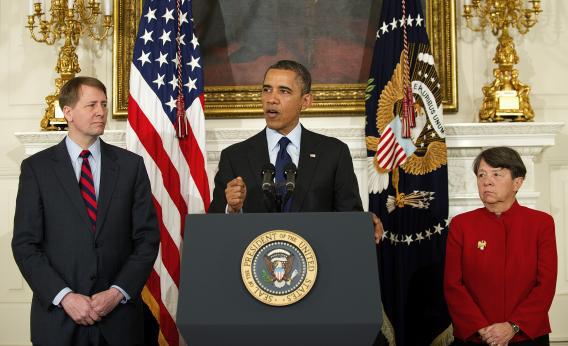When Mary Jo White was the most prominent U.S. attorney in America, she worked with Andrew J. Ceresney. When George W. Bush became president, she lost the U.S. attorney gig and became a defense lawyer, in which capacity she worked with Andrew J. Ceresney. Now Barack Obama has appointed her to run the Securities and Exchange Commission, so naturally she’d like to bring Ceresney on board. But when White and Ceresney were working the white-collar defense beat, they both represented a lot of banks and other Wall Street figures, which is naturally raising questions.
Asking question is great, but it’s worth emphasizing that these kind of biographical inquests have very little predictive power in terms of understanding people’s likely policy trajectories.
If you think about major financial regulatory figures of the Obama years, I think you’d have to say that the most bank-critical regulators have been Gary Gensler of the Commodity Futures Trading Commision and Sheila Bair formerly of the Federal Deposit Insurance Corporation. Outside Bair’s work in various Republican Party staff jobs, her most prominent private-sector gig was as a lobbyist for the New York Stock Exchange. Gensler worked for Goldman Sachs. Tim Geithner, by contrast, is essentially a career civil servant. Larry Summers, somewhere between those camps in policy terms, is basically an academic and a policy entrepreneur but obviously does have some specific ties to the hedge-fund world. And of course the cossacks work for the czar—in this case, a law professor, community organizer, and politician from Chicago.
In retrospect, obviously you can back all this up. Bair has deep ties to the financial industry but comes specifically from a Midwestern banking tradition that’s skeptical of both large Wall Street firms and loose monetary policy. You see Bair-style views from Esther George, current president of the Kansas City Federal Reserve Bank, and also from George’s predecessor, Tom Hoenig, now following in Bair’s footsteps at the FDIC. Geithner’s takeaway from his years of work as a financial regulator is that the biggest mistake countries make in financial crises is excessive concern with moral hazard, and underconcern with present-day instability.
None of which is to deny the obvious reality that people’s life experience and connections shape what they do. But it’s hard to read in a straightforward way. If White and Ceresney turn out to be the toughest enforcement team the SEC’s ever seen, then I’m sure we’ll all hear about how their years working the defense beat gave them deep insights into Wall Street’s tricks that they used to great effect upon their return to their lifelong passion for prosecution. That isn’t to say they will be the toughest team the SEC has ever seen. But most likely the best way to figure out what they think about controversial public policy issues is to ask them, and the most realistic forecast is that they’ll lead a big crackdown if and only if that’s what the president of the United States asks them to do.
For what it’s worth, the best quantitative academic study I’ve seen (PDF) suggests that SEC staff lawyers who rotate into the private sector are tougher prosecutors than those who don’t.
